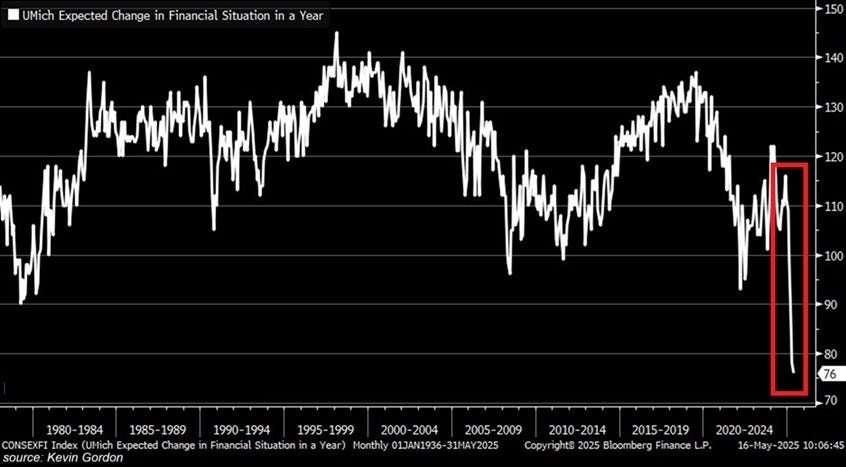Debt Crisis and Consumer Expectations Worsen, Banks to Launch Stablecoin, US-EU Tensions Escalate
Weekly Newsletter
Greetings, All!
It’s been a long and very eventful week. Let’s catch up on the latest top headlines, opinions, and recommendations.
In addition to the top headlines in economics, finance, and geopolitics, at the end of the Weekly Newsletter, there is a brand new section - Key Events This Week - to help you stay current on the most important upcoming dates.
The Ukraine Crisis: The Secret Power Behind Zelensky - Who’s Really in Charge? - Interview with Dr. Nicolai Petro
I had a fascinating conversation with Dr. Nicolai Petro, a prominent political scientist and a leading expert on Ukraine and Russia. The interview was truly eye-opening, as was Dr. Petro’s book, The Tragedy of Ukraine.
The evolution of Ukrainian politics post-2014 reveals deep internal divisions shaped by historical, linguistic, and cultural differences. While President Poroshenko was democratically elected and initially recognized by Russia, his administration escalated tensions by redefining local unrest in Donbas as a war with Russia, abandoning early peace frameworks like the Minsk Accords. This shift coincided with the growing power of far-right nationalist movements, primarily rooted in Western Ukraine, which gained influence through foreign funding and the Maidan coup. These Western-funded groups promoted a narrow Galician identity and marginalized other Ukrainian identities, especially the predominantly Russian-speaking populations of eastern and southern Ukraine. Under President Zelensky, initially elected on a peace platform, media freedom and cultural pluralism have been severely restricted, further entrenching a hardline nationalist agenda. Independent voices and opposition media have been suppressed, while dissenting narratives are labeled pro-Russian. As the war continues, Zelensky’s legitimacy relies increasingly on nationalist factions who reject compromise. The result is a political environment hostile to the millions of Ukrainians identifying with the Malaros or Eastern Ukrainian identity.
We also discussed:
The origins of Ukrainian nationalism
The crisis of Ukrainian identity: Russia vs. Poland
Post-Maidan nationalist politics in Ukrainian politics
A path toward conflict resolution
Prepare for Economic CRISIS as Money Supply Declines and Government Spending Surges - Interview with Dr. Steve Hanke
Contrary to popular belief and political rhetoric, particularly from former President Trump, the U.S. trade deficit is not caused by foreigners "ripping off" America. Instead, it results from Americans spending more than the nation produces (its Gross National Product). To balance this excess spending, the U.S. runs a trade deficit—an accounting necessity, not a sign of economic failure. The deficit is financed by capital inflows, as foreigners purchase American assets, such as bonds and equities. This inflow of capital makes the trade deficit sustainable and even beneficial in some ways.
The trade deficit is thus not a policy failure or threat, but a reflection of broader macroeconomic choices. Efforts to "fix" it through tariffs are misguided. Tariffs do not reduce the overall trade deficit; they only shift where imports come from, distorting trade patterns rather than correcting any imbalance. For instance, heavy tariffs on Chinese goods would reduce imports from China but increase them from other countries. Ultimately, the misunderstanding of basic accounting identities leads to unnecessary concern and harmful trade policies. The focus should be on smarter economic policy, not blaming foreign nations or relying on counterproductive tariffs.
We also discussed:
$500 Billion in Unrealized Losses on U.S. banks’ books
The impact of new banking regulations, specifically Basel III, on U.S. banks
How the decline in money supply impacts inflation
Those of you interested in taxes, personal finance, and small businesses might find my second YouTube channel, Behind the Numbers, interesting. I relaunched it this week, and moving forward, you’ll find weekly content dedicated to helping you become an entrepreneur, personal and business taxes, and finance. There will be interviews, too! You are welcome to subscribe (it’s free!) here: Behind the Numbers on YouTube.
Thank you to all my subscribers for being part of World Affairs in Context. Your support makes the newsletter happen, and your questions, ideas, and suggestions inspire it. Please consider becoming a paid subscriber, which will help contribute to the resources needed to produce more content on the platform. If you’d like to make a one-time contribution, please do so via PayPal or Buy Me a Coffee.
The House of Representatives passed Trump’s “big and beautiful” bill.
It proposes $1.5 trillion in spending cuts, including reductions to Medicaid and other social programs. As the bill moves to the Senate, there will be adjustments. However, the key takeaways are as follows:
Permanent Tax Cuts: It makes the individual and corporate tax cuts from 2017 permanent, including a 20% deduction for pass-through businesses and a reduced corporate tax rate.
Child Tax Credit: The child tax credit is increased to $2,500 through 2028, providing more relief for families.
State and Local Tax (SALT) Deduction: The SALT deduction cap is raised to $30,000 for taxpayers below $500,000, benefiting residents in high-tax states.
Healthcare Provisions: The bill adds work requirements to Medicaid, increases coverage fees, and prohibits Medicaid from funding gender-affirming care and abortion services.
US consumers' expectations about their financial situation over the next year dropped to an all-time low in May. According to the University of Michigan survey, consumer expectations are now lower than in 2008 and the late 1970s, when inflation was at 12-13%. 1 year ago, these expectations were 8 times higher at 2.5%.
The US Treasury said in a statement that by early next year, the country will stop circulating new pennies. Businesses will need to start rounding up or down to the nearest 5 cents. A penny currently costs 4 cents to make. Cutting production is set to save $56 million per year.
According to the CBO, the US debt-to-GDP ratio is set to reach 220% by 2055. By comparison, in 2020, the deficit hit 14.7% of GDP, only below World War II levels.









